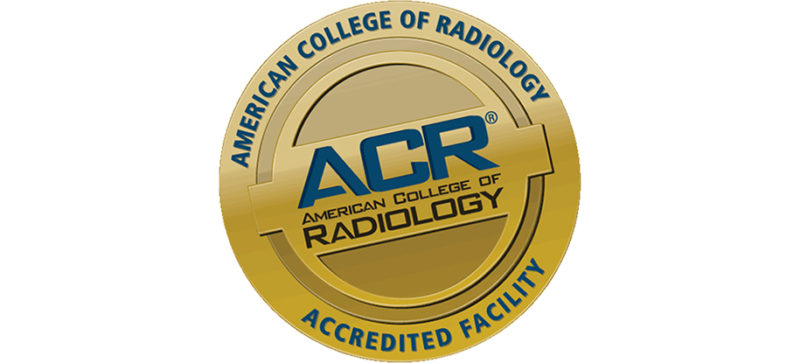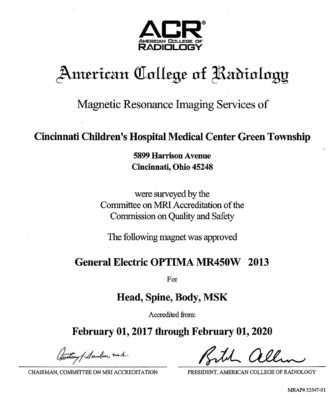
Each year, various Radiology modalities at Cincinnati Children’s complete the process of accreditation through the American College of Radiology (ACR), which is one of several accrediting bodies. The ACR is the most comprehensive program that provides a pathway for evaluation and accreditation for CT, MRI, Ultrasound, and Nuclear Medicine (including PET) imaging modalities.
To become ACR accredited in any one modality, as a department and institution, we must submit for evaluation: credentials of personnel (radiologists, technologists, and medical physicists) and their ongoing CME records, departmental and institutional policies and procedures, patient safety (including contrast administration, radiation dose, infection control, ferromagnetic control, etc.), patient and phantom image quality, quality assurance (QA) testing results for each scanner, and other patient care activities.
Why do we submit for ACR accreditation? ACR accreditation is required for reimbursement for the technical component under Medicare part B for non-hospital outpatient care facilities. As a hospital, we are exempt from this requirement. However, as of 2015, The Joint Commission introduced new language for hospital accreditation under the section EC.02.04.03 that adopted the language of ACR accreditation for each imaging modality: CT [EP 15, 17, & 19(A)(D)], MRI [EP 20 (A)(D)], nuclear medicine [EP 21(A)(D)], and PET [EP 22(A)(D)]. In addition to the new requirements from The Joint Commission, Ohio state regulation also adopted ACR accreditation testing language. Thus, for our department, ACR accreditation has become the new standard for evaluation of imaging excellence.

The next important question is: how do we become accredited? Each imaging modality has its separate requirements, but the requirements are generally the same (with the exception of ultrasound). Each scanner in each modality group is subdivided into subspecialties. For example, in MRI, each unit is separately evaluated based on the imaging case load of that particular scanner (e.g., head/neck, spine, MSK, body, MRA, and cardiac). Each scanner is evaluated for the type of imaging performed and the number of cases per subspecialty imaged per calendar year. Not all scanners must be accredited for each subspecialty (i.e., some MRI units may only submit for MSK, if that represents the majority of all scans performed on that magnet), but all scanners within a modality must be accredited that don’t meet exemption status. We just recently completed accreditation on many of our MRI scanners, including our Green Township and Kenwood locations.
For CT, subspecialties are brain and body imaging for both adult and pediatrics; CT is the only modality that requires both an image quality and a patient protocol dose calculation to be submitted per subspecialty and scanner.
Our nuclear medicine team also submitted their ACR application recently. For that modality, subspecialties are planar, SPECT, cardiac, and PET includes oncology, brain, and cardiac. The accreditation process for nuclear medicine is heavily focused on physics in nuclear medicine and our medical physicist, Dr. Sam Brady, entered our submission.
Ultrasound is unique in that there are subspecialties for which we can apply (obstetrics, gynecology, general, vascular, and pediatrics), but only a single set of patient images are required to be submitted for review, not a set of images per scanner like the other three modalities; in other words, ultrasound accreditation is a departmental status, not individual scanner status.
In the department, everyone works to make accreditation possible: engineering ensures the equipment is functioning properly, physics works with the modality managers and radiologists to fine tune image quality and radiation dose (where applicable), technologists work with our patients and the equipment to capture the best images possible, QI and modality managers maintain policies and procedures in accordance with state and national regulations, radiologist dictate reports in accordance with accepted standards and provides feedback at each level of this accreditation chain to ensure the highest quality care is performed at Cincinnati Children’s.
We continually strive to provide the best care possible for our patients and families!
Contributions by Dr. Samuel Brady and edited by Alyssa McAfee, (Coordinator-CT/MR).
